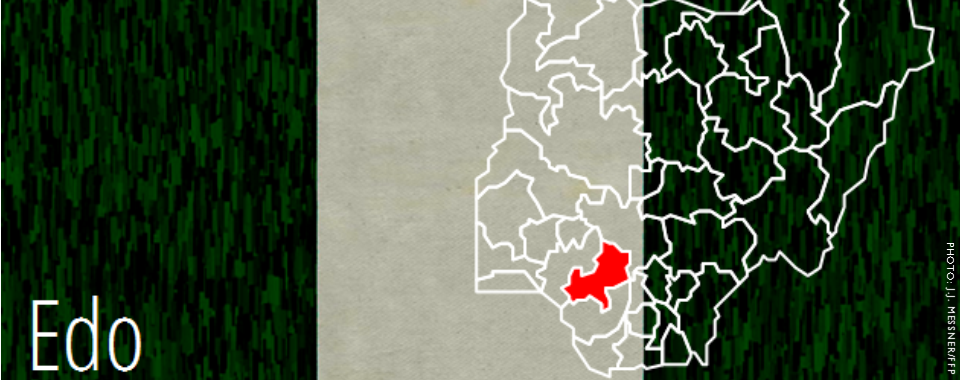BY NATE HAKEN AND PATRICIA TAFT*
Landlocked between Ondo, Kogi and Delta States, Edo is home to about 3.2 million people (2006 census), predominantly of Edo, Bini, Owan, Esan, and Afemai background. Edo’s economy centers on agriculture, including food crops such as yams, cassava, rice or maize and cash crops such as rubber, palm oil, cotton, cocoa and timber. The State’s capital, Benin City, is the center of Nigeria’s rubber industry. Mineral resources include granite, limestone, marble, lignite, crude oil, gold, and kaolin clay.
Edo’s state governor, Adams Aliyu Oshiomhole, assumed office in November 2008 after winning an appeal in the 2007 elections, which had initially declared his rival Oserheimen Osunbor governor. In July 2012, Oshiomhole was reelected for a second term in a landslide victory. Political tensions in the state rose throughout 2014 with an attempt to impeach the governor and a violent attack on lawmakers in October. The next gubernatorial elections are slated for 2016.
Edo was one of the Niger Delta’s more violent states on a per-capita basis from 2012 through 2014. Incidents of violence and associated fatalities have increased over the two-year period. Issues in Edo ranged from protests, criminality, abductions and domestic violence to clashes between gangs, cults, political groups and communities. The majority of these incidents were reported in the Oredo Local Government Area (LGA), home to Benin City, although violence was also reported in LGAs further north.
This Conflict Bulletin provides a brief snapshot of the trends and patterns of conflict risk factors at the State and LGA levels, drawing on the data available on the P4P Digital Platform for Multi-Stakeholder Engagement (www.p4p-nigerdelta.org). It represents a compilation of the data from sources listed below, not necessarily opinions of FFP or any other organization that collaborated on the production of this bulletin.
The summaries draw on data collected by FFP’s UNLocK, the Council on Foreign Relations’ NST, WANEP Nigeria, CSS/ETH Zurich, NEEWS/TMG, Nigeria Watch, and ACLED integrated on the P4P platform. They also draw on data and information from “Violence in Nigeria: Patterns and Trends,” by Patricia Taft and Nate Haken (Springer Press, April 2015).
*Hannah Blyth and Ania Skinner also contributed to this report.
